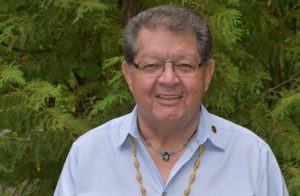Important testimony summarized in final days of Robinson Huron Treaty court case

By Kelly Anne Smith
NIPISSING FIRST NATION—The important Robinson Huron Treaty annuity case court is back in session in June to hear closing remarks. Mike Restoule travelled from Nipissing First Nation to Sudbury a day earlier to attend ceremony. He was invited by Atikameksheng Anishnawbek First Nation to prepare for the closing statements. A sweat lodge ceremony, drumming and a feast took place June 3.
Restoule is the man versus Canada in the case forcing judicial review of Treaties Robinson Huron and Robinson Superior signed in 1850, Restoule et al. v. Canada et al., Ontario Superior
Court File Nos: C-3512-14 & C-3512-14A. A claim was filed in 2014 against Canada and Ontario for long-standing and serious breach of the Treaty.
“I’ve been involved with the chiefs in bringing this forward for over 26 years now,” says Restoule, who was appointed by the Robinson Huron Trust members to be the Chair of the Trust in 2010.
Restoule facilitates all requirements for the case to proceed through the courts working closely with the legal team. He is also the liaison between the trustees and the 21 chiefs. He is part of the management committee for the six plaintiffs in the case – two from Manitoulin Island; two from the north shore of Lake Huron; and two from the Highway 69 corridor.
Final arguments for the Robinson Huron Treaty Annuity case began June 4 in Sudbury at the Radisson Hotel. A case involving the Robinson Superior Treaty is also being heard in court since last September, and it involves 21 First Nations: Atikameksheng Anishinabek, Batchewana First Nation of Ojibways, Dokis First Nation, Ojibways of Garden River, Henvey Inlet First Nation, Magnetawan First Nation, Mississauga #8 First Nation, Nipissing First Nation, Sagamok Anishnawbek, Serpent River First Nation, Shawanaga First Nation, Sheshegwaning First Nation, Thessalon First Nation, Wahnapitae First Nation, Wasauksing First Nation, Whitefish River First Nation, Aundeck-Omni Kaning First Nation, M’Chigeeng First Nation, Sheguiandah First Nation, Zhiibaahaasing First Nation, Wiikwemkoong Unceded Territory.
They argue that the federal and provincial governments have not upheld their part of the agreement in the 1850 Treaty in that William Benjamin Robinson desired for his Majesty to deal liberally and justly with all her subjects. The question is whether the four-dollar annuity payment in the agreement was frozen in time. The augmentation clause is being closely examined.
The case is marking a legal first with points in both Canadian Law and Anishinaabe Law being heard. A Sacred Fire burned close by the venue for people to offer tobacco/semaa and prayers.
As Restoule was preparing to start traveling, he looked forward to the sweat on Sunday afternoon.
“The lawyers from all four parties go in the sweat lodge. The one thing the judge says, ‘In the sweat lodge, we don’t talk about the case. We can talk about anything else. The case is reserved for the court room’.”
Restoule says the sweat helps with understanding each other.
“It really opens your mind. And it allows you to speak freely from the heart.”
Restoule explains the beginnings of the litigation.
“In the early 1990s, the chiefs could not find a way to take their case to court, they could never agree. Time and time again, as they tried to move forward, elections happened – chiefs and councillors were newly elected. Participants changed so the process took a step back. The other thing was the chiefs had no money.”
“The Toronto law firm was fired and the law firm of Nahwegahbow, Corbierre was hired. Then the chiefs formed a trust called the Robinson Huron Trust Litigation Fund.”
BMO has confidence in the case securing a loan for funding the legal team.
“This is a first in Ontario for a bank to fund litigation by a group of First Nations. We had to provide them with an independent legal opinion. The lawyer was positive in the legal opinion that the chances are sure that we were going to win this case.”
The loan has been guaranteed by the First Nations.
Restoule says moving into the final arguments, the court will hear a summary of all of the evidence given since September by 20 witnesses.
“All of the people in the various communities are very interested in this.”
Describing the three phases of the case, Restoule says phase 1 asks if there is a legal obligation for the Crown to increase the annuity beyond four-dollars per person per year ends this June. Phase 2, expected to run six-weeks next March, will deal with legal technical arguments including the Doctrine of latches – taking too long to bring a case to court.
“The third phase of the case would be determination of settlement amount. That’s probably going to end up in negotiation. The court may be reluctant to determine on its own what a settlement amount could be because there are a lot of things to consider.”
Restoule points to the Treaty—if the Crown gains more revenue from the territory, the annuity would be increased.
“We have to determine some sort of formula. We also have to find out what the revenue was since the 1800s.”


